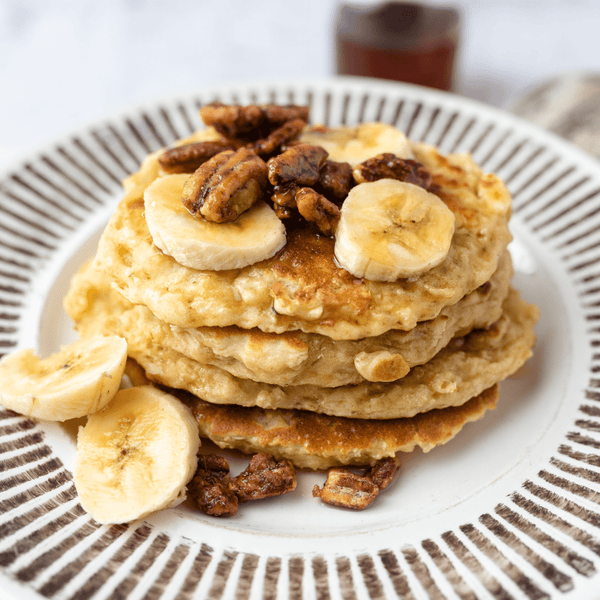You're standing in the gym locker room, protein bar in hand, checking the clock.
Should you eat it now for energy? Or save it for after when your muscles are screaming for recovery?
If you've ever had this mini internal debate, you're not alone. The whole "should you eat a protein bar before or after a workout" question has confused gym-goers for years. And honestly? The fitness world hasn't made it any clearer with all the conflicting advice floating around.
Here's the thing: the answer isn't as black and white as most people think.
Your workout type, fitness goals, and even your gut health all play a role in the timing game. Some people thrive on pre-workout fuel, while others prefer the post-workout recovery boost.
In this guide, we'll break down the science (without the jargon), explore what your body actually needs, and help you figure out the timing that works best for you. Plus, we'll share why most protein bars might be working against you, and what to look for instead.
Ready to settle this debate once and for all?
The Science Made Simple: When Your Body Actually Needs Protein
Here's the truth that'll save you from overthinking: your body is way smarter than the fitness industry gives it credit for.
The Myth: You have exactly 30 minutes after your workout to eat protein, or your gains disappear forever.
The Reality: Your muscles stay in "repair mode" for up to 48 hours after exercise. That scary "anabolic window" everyone talks about? It's more like an open door that stays cracked for hours, not a slamming gate.
Think of muscle protein synthesis like construction work. When you lift weights, you're basically creating tiny tears in your muscle fibers (the demolition phase). Your body then rebuilds those fibers stronger than before (the construction phase). Protein provides the building materials for this repair job.
So is it better to eat a protein bar before or after a workout? Both timing strategies work, but for different reasons:
Before: Gives your muscles amino acids to prevent excessive breakdown during exercise.
After: Kickstarts the rebuilding process when your muscles are most receptive.
The real game-changer? Consistency matters more than perfect timing. Studies show that your total daily protein intake trumps when you eat it. Your body doesn't reset at midnight, it's constantly using protein throughout the day.
Bottom line: stop stressing about the clock and focus on fueling your body regularly.
Pre-Workout Protein Bars: The Energy Boost Game
Eating a protein bar before your workout is like giving your body premium fuel before a road trip.
Here's what happens when you fuel up first:
Sustained Energy That Actually Lasts: Unlike sugary pre-workout drinks that spike and crash, protein provides steady energy. Your muscles get a reliable stream of amino acids to power through those last few reps when willpower alone isn't cutting it.
Muscle Protection Mode: Think of pre-workout protein as insurance for your gains. When you exercise on empty, your body might start breaking down muscle tissue for energy. Not ideal if you're trying to build or maintain muscle mass.
The Sweet Spot: 30-60 Minutes Before: This timing gives your body enough time to start digesting without leaving you feeling heavy or sluggish during your workout.
What to Look For (And Avoid): Skip bars loaded with sugar alcohols or artificial junk that'll have you running to the bathroom mid-squat. You want clean protein, minimal ingredients, and something that won't sit like a brick in your stomach.
This is exactly why we created our Chocolate Brownie Protein Bars. They're designed to fuel your workout without the gut drama. Made with clean ingredients and MCT oil for sustained energy, plus adaptogens like ashwagandha to help manage workout stress.
“So should I have a protein bar before or after workout?”, you might ask. If you're someone who needs that energy boost and hates feeling depleted halfway through, pre-workout might be your sweet spot.
Post-Workout Protein Bars: The Recovery Window
Your Muscles Are Hungry (Literally): Right after you finish that last set, your muscle fibers are in full repair mode. They're actively looking for amino acids to patch up those microscopic tears and build back stronger. It's like having a construction crew ready to work,they just need the materials.
The 2-Hour Sweet Spot: Forget the panic-inducing 30-minute rule. Research shows you have up to 2 hours post-workout when your muscles are most receptive to protein. That's plenty of time to shower, drive home, and grab your recovery fuel without stressing.
How Protein Actually Builds Muscle: Here's the simple version: protein breaks down into amino acids, which become the building blocks for new muscle tissue. More protein available during recovery = better muscle protein synthesis = stronger, bigger muscles over time.
Real Talk from Real People: One of our customers told us she keeps our Chocolate Brownie Protein Bar in her gym bag as her go-to post-workout treat. "It tastes like dessert but actually helps me recover," she said. "Plus, I never feel bloated or gross after eating it like I do with other bars."
So is it best to eat a protein bar pre- or post-workout? If your goal is maximum muscle building and recovery, the post-workout window gives you the biggest bang for your buck. Your muscles are primed and ready to use every gram of protein you give them.
What Your Workout Type Actually Tells You
Not all workouts are created equal, and neither is your protein timing strategy.
Cardio vs. Strength Training: Different Games, Different Rules
Cardio sessions (running, cycling, HIIT): You're burning through energy fast. A pre-workout protein bar can prevent muscle breakdown during longer sessions. Think of it as protecting your gains while you torch calories.
Strength training: Your muscles are getting torn down and rebuilt. Post-workout protein becomes more critical here since you're actively trying to build muscle mass.
Morning vs. Evening: When Life Gets in the Way
Morning warriors: Your body's been fasting all night. A pre-workout bar can kickstart your metabolism and give you the energy to crush that 6 AM session.
Evening exercisers: You've been eating all day, so your body has fuel reserves. Post-workout protein might make more sense to aid overnight recovery.
Your Individual Factors Matter Most
Goal: Weight loss? Pre-workout might help you exercise longer and burn more calories.
Goal: Muscle building? Post-workout takes priority for recovery and growth.
Sensitive stomach? Maybe skip pre-workout entirely and focus on post-recovery.
Crazy schedule? Honestly, whenever you can consistently fit it in wins.
The bottom line: a marathon runner training for race day has different needs than someone doing 20-minute strength circuits. Listen to your body and adjust accordingly.
The Gut Check: Why Most Protein Bars Fail During Workouts
Here's the uncomfortable truth: most protein bars are gut bombs waiting to explode during your workout.
The Sugar Alcohol Disaster: Ever eaten a protein bar and felt like your stomach was doing somersaults mid-squat? Thank sugar alcohols like maltitol and sorbitol. They're cheap fillers that cause gas, bloating, and that urgent bathroom sprint nobody wants during deadlifts.
When Artificial Meets Exercise: Your digestive system is already working overtime during workouts. Add artificial additives, preservatives, and mystery ingredients, and you're asking for trouble. Your body has to work harder to process junk when it should be focusing on performance.
Clean Ingredients = Clean Performance: This is exactly why we obsess over what goes into our bars at 100 Cal Snacks. No sugar alcohols, no gut-wrecking additives, just clean, functional ingredients.
When you're pushing through that final set, the last thing you need is your snack choice working against you. Your gut should be your ally, not your enemy.
The difference between a good workout and a great one often comes down to what you put in your body beforehand. Choose wisely.
Smart Snacking: How to Choose the Right Protein Bar for Your Workout
Not all protein bars are gym-worthy. Here's your cheat sheet for picking winners.
Green Light Ingredients: Look for whole food proteins (pea, hemp, or clean whey), natural sweeteners like dates or stevia, and real ingredients you can pronounce. Bonus points for functional add-ins like MCT oil for sustained energy or adaptogens for stress support.
Red Flag Ingredients: Run from sugar alcohols (maltitol, sorbitol, xylitol), artificial colors, high fructose corn syrup, and ingredient lists that read like a chemistry experiment. If you need a degree to understand the label, your gut probably won't either.
Calorie Strategy by Goal: Weight loss: Stick to 100-200 calories to fuel without overdoing it. Muscle building: 200-300 calories with higher protein content. Endurance training: Look for a mix of protein and complex carbs.
Label Reading Like a Pro: Check protein content (aim for 10+ grams), keep sugar under 10 grams, and scan for fiber content (3+ grams is ideal).
This is exactly why our Peanut Butter Protein Bars at 100calsnacks.com hit the sweet spot: exactly 100 calories, 6g plant-based protein, zero sugar alcohols, plus functional ingredients like ashwagandha and MCT oil. They taste like dessert but perform like the clean fuel your body actually needs.
Your workout deserves better than gas station bars.
The Real Answer: It's Not Just About Timing
Here's the plot twist: obsessing over perfect timing might be missing the bigger picture.
The Real Game-Changers:
- Consistency beats perfection. Eating protein regularly throughout the day trumps stressing about the exact minute you consume it.
- Listen to your body. Some people feel energized eating before workouts; others feel sluggish. Your gut (literally) knows best.
- Quality matters more than timing. A clean, gut-friendly bar any time beats a sugar alcohol bomb at the "perfect" moment.
Your Action Plan: Try both approaches for a week each. Notice how you feel, perform, and recover. The timing that leaves you feeling strongest and most consistent? That's your answer to "should you eat a protein bar before or after a workout."
Ready to fuel your workouts the right way?
Skip the gut-wrecking bars and try our Chocolate Brownie Protein Bars. At exactly 100 calories with clean ingredients and zero bloating, they're designed to work with your body, not against it.
Taste the bar that customers are calling the best low-calorie snack of 2025. Shop now!






